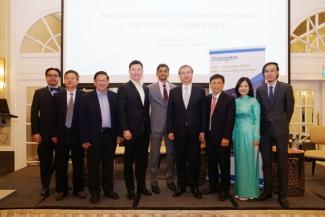
Singapore Management University (SMU) and Stratagem Group co-organised the fifth SMU-Stratagem Group Sino-Singapore Dialogue on 13 April 2018, themed “Sino-ASEAN cooperation and what it means for businesses”. Over 200 participants from the business community, academics as well as senior government officials from Singapore, China, Thailand and Vietnam, attended the event.
Distinguished speakers from China, Singapore, Thailand and Vietnam shared their perspectives on Sino-ASEAN cooperation and what it meant for businesses. This was framed in the context of the recent Memorandum of Understanding (MOU) signed by the Singapore Ministry of Trade and Industry (MTI) and Enterprise Singapore, with China's National Development and Reform Commission on 8 April 2018. The MOU on “Third-party Market Cooperation” aims to promote greater collaboration between companies from both countries in third-party markets along the Belt and Road routes, paving the way for promising economic opportunities for ASEAN countries.
In his welcome address, Professor Forrest Zhang, Associate Dean (Research) of School of Social Sciences and Associate Professor of Sociology at SMU, said: “The SMU-Stratagem Sino-Singapore Dialogue puts ‘dialogue’ at the center of the programme, and it was initiated in the spirit that on-going dialogue is crucial to mutual understanding and complimentary interests.”
With ASEAN making strides in its progress as an association over the last 51 years and the marking of the 15th anniversary of the strategic partnership between China and ASEAN this year, the promise of continued cooperation among nations remained bright. Prof Zhang highlighted ambitious and forward-looking initiatives implemented for the regions’ future prosperity, such as the Belt and Road Initiative (BRI) in 2013 and the Master Plan on ASEAN connectivity 2025.
The BRI had identified five areas for enhanced connectivity: policy, infrastructure, trade, finance, and people; whilst ASEAN 2025 focused on the five strategic areas of sustainable infrastructure, digital innovation, seamless logistics, regulatory excellence and people mobility.
According to Prof Zhang, the common vision shared by China and ASEAN is patently clear, and the opportunities for co-operation, growth and sustainable and inclusive development that this shared vision creates should make everyone excited and confident that the mutually beneficial relationship between China and ASEAN will deepen.
Amidst the climate of multilateralism and trade protectionism, Dr Shen Shishun, Committee Member of China National Committee for Pacific Economic Cooperation, shared at the dialogue that China will continue to deepen its strategic cooperation with ASEAN and strengthen the strategic mutual trust in facing global and regional challenges through the Belt and Road Initiative and Master Plan on ASEAN Connectivity 2025.
Dr Su Hao, Founding Director of Center for Strategic and Peace Studies of China Foreign Affairs University, shared the imagery of the China-ASEAN Calabash (or bottle gourd) to describe the current symbiotic economic relationship between China and ASEAN which has evolved from earlier trans-regionalism and inter-regionalism. In the present Calabash model, regional economies are far more inter-connected than ever.
Mr Apipong Khunakornbodintr, Director of China Market and Acting Director of Thailand Overseas Investment Promotion for Thailand Board of Investments, shared how the Thai government intends to connect the Eastern Economic Corridor (EEC) to China's One Belt One Road (OBOR) initiative. Between 2011 to 2017, China’s investment projects in Thailand had reached approximately 5.1 billion USD, with the connection of EEC to OBOR, the economic flow between the two countries will be enormous.
With the Vietnam’s middle-income group on the rise, private consumption will reach a sky-high of US$250 billion in 2020. Dr Lam Thanh Ha, Senior Lecturer of the Faculty of International Economic in Diplomatic Academy of Vietnam, presented how Chinese and Southeast Asian countries can pursue opportunities in the consumerist market by leveraging on local networks and franchising models.
Professor Ngo, Chairman of Arbitration & International Dispute Resolution Practice Group – ASEAN Legal Alliance, cautioned that ASEAN being made up of 10 different countries, each has its unique cultures, customs, government, legal system and perspectives in life. Hence, in navigating business ventures between China and ASEAN, businesses need to be mindful of these innate differences. Singapore, being an absolutely independent judiciary with politically stable and strategic location, remains one of the most preferred places for arbitration.
At the panel discussion, moderated by Dr Kaho Yu, Associate Lecturer of Chinese University of Hong Kong, all the panelists agreed that both China and ASEAN have to continue deepening Sino-ASEAN relations to reach a mutually beneficial economy for all.
Adrian Phua, Managing Director of Stratagem Group said, “Against the backdrop of trade protectionism, it is important for Singapore to continuously play a pivotal role in bridging Sino-ASEAN relations towards a mutually beneficial and reciprocal relationship. And while it is important to understand the strategic landscape, it must translate to practicable decisions for businesses to act on.”
About the SMU-Stratagem Group Sino-Singapore Dialogue
Since 2015, Stratagem Group has partnered with SMU to launch the SMU-Stratagem Group Sino-Singapore Dialogue series. The Dialogue will be conducted twice annually, with a total of ten sessions to be held by 2021. It aims to promote greater awareness and understanding of Sino-Singapore developments, and how these can influence and be impacted by regional and international affairs. Speakers for the Dialogue sessions will include retired senior government officials, established academics and renowned businessmen from China, who will share their expertise and knowledge on relevant topics.
[Featured Photo: The Sino-Singapore Dialogue speakers and hosts from SMU and Stratagem Group. L-R: Prof Steve Ngo (Chairman of Arbitration & International Dispute Resolution Practice Group – ASEAN Legal Alliance), Dr Shen Shishun (Committee Member, China National Committee for Pacific Economic Cooperation), Mr Er Kwong Wah (Advisor, Stratagem Group), Mr Adrian Phua (Managing Director, Stratagem Group), Mr Sriven Naidu, (Director- Programme Development and Partnerships, SMU), Dr Su Hao (Founding Director of Center for Strategic and Peace Studies of China Foreign Affairs University), Mr Apipong Khunakornbodintr (Director of China Market and Acting Director of Thailand Overseas Investment Promotion), Dr Lam Thanh Ha (Senior Lecturer of the Faculty of International Economic in Diplomatic Academy of Vietnam), Dr Yu Kaho (Associate, Chinese University of Hong Kong)]